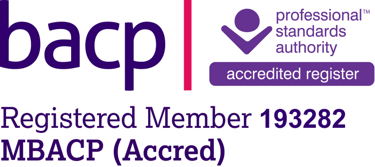EMDR
04
Letting go of traumatising memories


What is trauma?
When sensory information that is very emotionally disturbing comes into our bodies, it gets stuck in the Central Nervous System in the right hemisphere of the brain. This stuck information is not processed in the way other sensory information is and remains here. When other information comes in that reminds us of this event, the stuck memory is triggered and emotionally re-experienced in the present. This can be experienced as flashbacks, intrusive thoughts and nightmares - all symptoms of Past Traumatic Stress Disorder (PTSD).
What is EMDR and how does it work?
EMDR (Eye Movement Desensitisation and Reprocessing) is a therapy that helps the brain to reset, releasing the emotion from the disturbing memory so clients still remember it but are not longer upset.
Although it’s not fully known how it works, it seems EMDR directly influences the way that the brain functions, restoring normal information processing. After EMDR, the disturbing memories are no longer disturbing when brought to mind. The client can still remember what happened but sees and feels the memory as neutral or nothing.
It is possible that EMDR is a conscious harnessing of the brain’s natural processing in dreaming or REM (Rapid Eye Movements) sleep. Without any pharmacotherapy, EMDR is helping the brain to work through distressing experiences from the past. Clients are asked to bring up a disturbing memory and then follow a therapist’s repeated hand movements known as Bilateral Stimulation. Research is continuing but it is thought that this creates biochemical changes in the brain that aid processing of information. It is likely these changes occur in the limbic system.
How long does it take?
This depends partly on what the individual has been through. With single incident trauma, it can take as little as 1-3 sessions of EMDR therapy. With more complex trauma (multiple memories over long time periods), it can take longer. In addition, some preparation beforehand is needed to help the client move safely through the process.
Want to find out more?
Read up on EMDR here https://emdrworks.org/what-is-emdr/and contact me for a discussion. EMDR sessions are longer than talking therapy and involve resourcing to help you to calm and ground yourself at the end and in between sessions. We’ll work together to find out more about your circumstances and history and for you to understand the process before we begin.
What I offer
I am a qualified EMDR Therapist, having completed Levels 1-4 accredited EMDR training with EMDR Works (accredited by EMDR Europe). I offer this therapy in person and online. I am a member of EMDR Association UK and am supervised by one of the EMDR Consultants that trained me.
Some areas where EMDR can help include PTSD (post-traumatic stress disorder), complex grief, accidents, assaults, domestic violence, war and military experiences, childbirth trauma, medical or health anxieties, childhood abuse (sexual, physical, emotional or neglect) and attachment trauma, anxiety, low self-esteem, depression. Please contact me if interested in this therapy: Lisa@talkdynamic.co.uk
EMDR – Is it for me?
Are disturbing memories from the past coming into your everyday world?
This might be in the form of dreams, flashbacks, nightmares, night terrors, sudden hijacking, paralysing or distressing thoughts and huge feelings accompanying all or any of the above?
Do smells, sights, sounds, tastes or touch seemingly unrelated to the past trigger big emotional responses?
Or do fragments of past times show up in present circumstances and pull you back to those challenging times?
If any of this sounds like you, then EMDR (Eye Movement Desensitisation and Reprocessing) therapy could help.
What do clients say about EMDR?
‘The EMDR has been absolutely fantastic. I’m noticing a massive difference in terms of shame and guilt that I was feeling at the start of my sessions with you. Those feelings have definitely lessened. Very happy with how much I feel that I’ve progressed.’
‘Lisa and EMDR have helped me to move several traumatic experiences from being all consuming and repeating over and over in my mind to memories with far less power over me. I was sceptical at first but I’m glad I’m now enjoying some lightness as my past is starting to have less of a hold over my present and future.’
'Lisa suggested EMDR as a way to work through memories of events in my childhood and early adulthood that were coming up too regularly as intrusive thoughts, affecting my mood and ability to manage my reactions to smaller frustrations day to day. I didn't know what to expect but Lisa took me through the whole process step by step. I found EMDR very helpful as a way to reprocess those events and I believe it's had a positive impact - I think about them less often and when I do, I'm having a much healthier emotional response.’
'EMDR and you have helped me to be more positive and stronger in my self-belief. I am coping with my mother and not allowing her to upset me so much. I also feel stronger and more confident in my relationship with my partner. I have achieved so many of my goals for which I thank you.'
I am based in South East London and work with clients in person, online and by telephone. If calling, please leave your mobile no on the voice message.
Working hours:
Mon-Wed: 8am - 8pm Thurs & Fri 8am - 5pm
Closed weekends
Contacts
lisa@talkdynamic.co.uk Mob: 07789278820

Lisa Hitchen
Integrative Therapist, EMDR Therapist & Clinical Supervisor Dip (Couns), Reg Member MBACP Accred Member of EMDR UK






